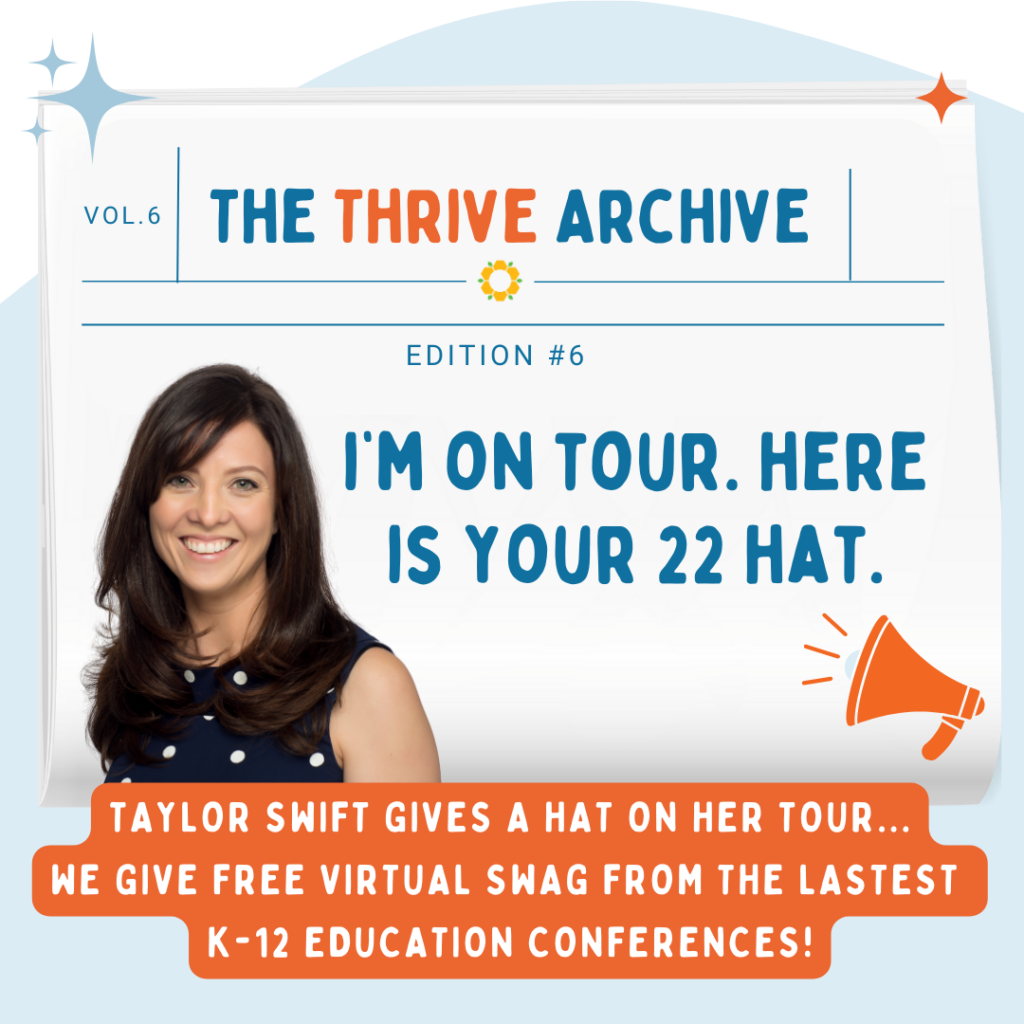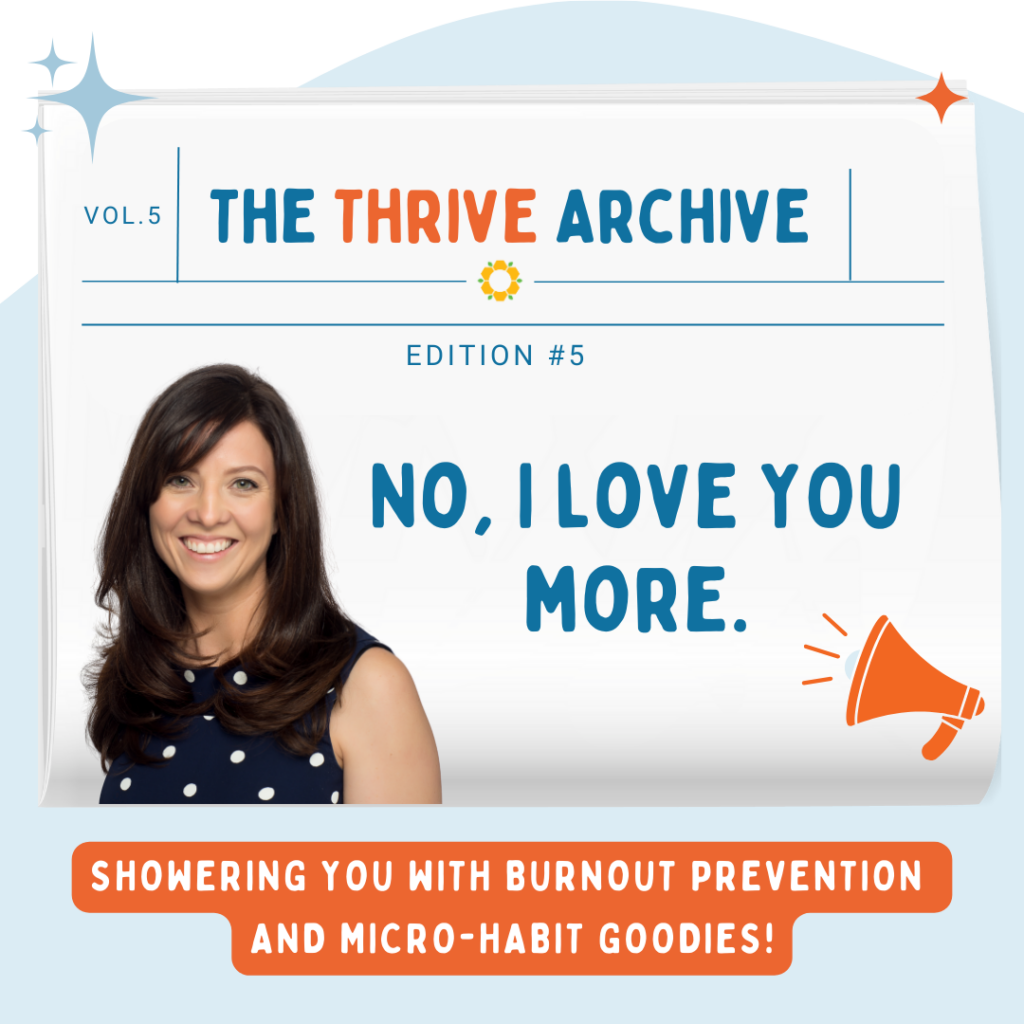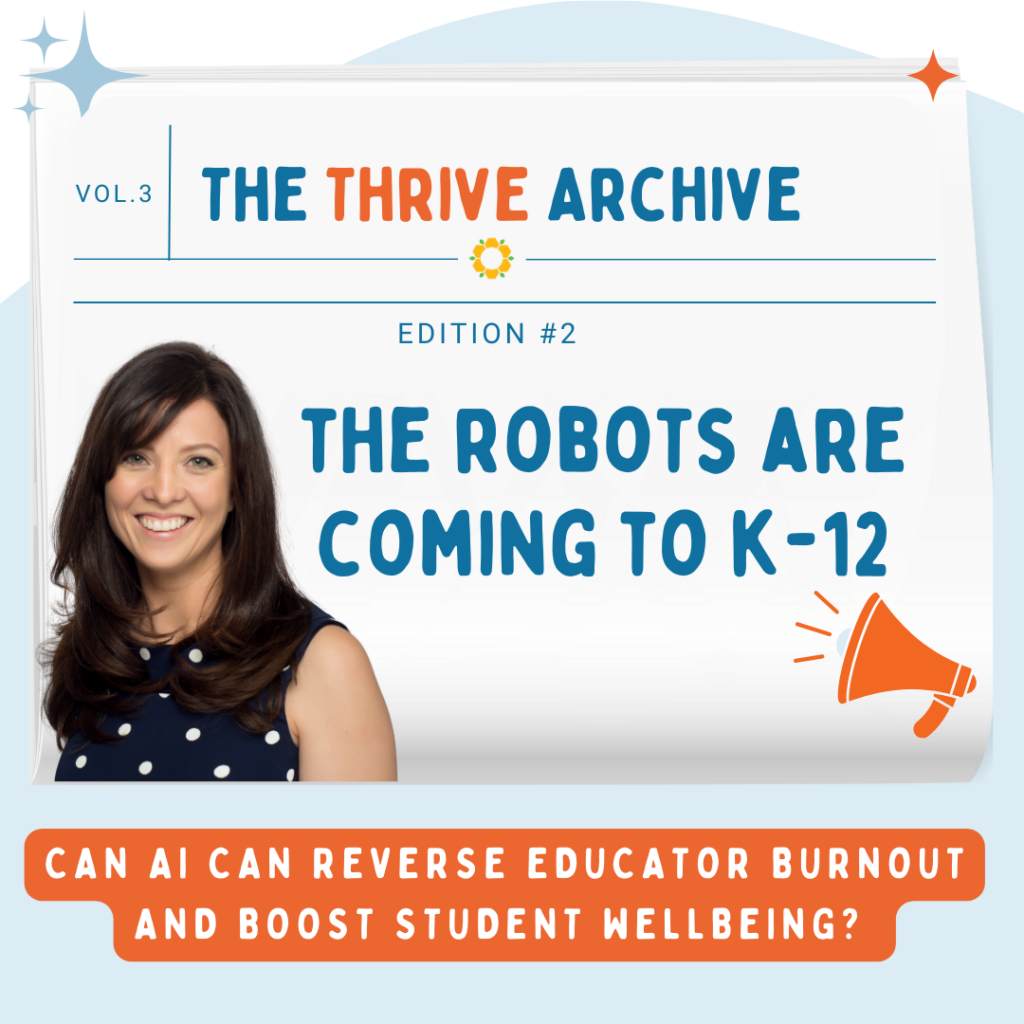- For School Psychologists
What is it Like to be a School Psychologist?
I get quite a few emails from prospective school psychologists, asking me what the career is really like. Perhaps they’ve read a review of our illustrious profession on a job site and got scared off – kind of like when you read one bad Yelp review of a place and write it off. Maybe they’ve heard it’s a job that is all testing, or just that it’s really stressful.
I’ll admit, a lot of my focus on this blog over the past three years has been on burnout prevention for school psychologists, and finding your way back to your love of the profession.
I don’t want my lens of infusing self-care into challenging circumstances to paint an unfair picture for new folks that the stress of being a school psychologist outweighs the rewards!
An unbalanced look at the rewards and challenges of school psychology can leave folks interested in the career backing slooooowly away from the grad school job applications.
But wait!
This career is ah-may-zing and I love it!
How do I love school psychology? Let me count the ways.
Top 10 Reasons to Be a School Psychologist
1) No Two Days Are Ever the Same!

Anyone who has read my blog for a while will have ample evidence that you never know what you’re going to get when you show up at a school site! One day, I’m chasing a kid over a brick wall, parkour style, because he doesn’t want to do testing with me, and the next day, I’m having a wonderful therapeutic moment with that same kiddo doing an art project about how his brain works.
School psychologists work with different age groups – from preschool to young adults – sometimes all in the same day. You can do an assessment with a student, consultation with a teacher or parent, counseling with one kid AND a group, meet with district leaders about improving a school-wide program, all in one day.
If variety is the spice of life, then OMG this career is spicy! If you enjoy thinking on the fly, problem-solving, and are open to what the day brings you, you’ll love school psychology.
2) Basking in the Awesomeness of Kids (and all their SHENANIGANS).

Hands down, the kids make it all worth it. They are FUNNY. Every day, there’s a moment where I make a connection with a kid or witness kids being KIDS and just bask in their reflected awesome. There is something so powerful about working with students and feeling a positive connection when you work with them individually. As one school psychologist wrote, her favorite part about being a school psychologist: “Oh man…the good feeling you get when you see a child after an evaluation is complete and they glow and hug and want to come back.”
Another perk is that as a school psychologist, you can find the age group that you love to work with, and mix it up. With such an age range, you can appreciate different things about different ages.
At the elementary level, the kids are so dang cute and earnest and you’ll get a ton of drawings and high-fives and hugs from your students.
At the middle school level, you get to see the social drama unfold and be the calm in their middle school storm to help them through it. Middle schoolers are ripe and ready to connect with you, even if at first, they pretend they’re too cool for school.
High school students are amazing as well, because they have a huge capacity for insight and you can see real positive change unfold before your eyes.
No matter the age group you work with, I can guarantee that as a school psychologist, there will be several times a day where you’ll be laughing and enjoying some awesome kid shenanigans.
3) You Have a Ton of Autonomy in Your Work Day.

I polled the Notes from the School Psychologist Facebook Fans and Thriving School Psychologist Instagram followers about what they love about being a school psychologist. One thing that came up that I’ve taken for granted, but now see as a definite perk, is that in your daily work, you are not micromanaged.
You get your caseload, and you run with it. You decide what to do and when to do it. You decide when to start and end work with a student, as well as how deep you go with each student, based on your own judgement. For the most part, you set your own schedule and have flexibility as to how you want to organize your tasks.
Also, as one school psychologist wrote, “You get to use the restroom whenever you want!” (Sorry teachers…we feel for you on that one!).
4) You Get to Build Long-Term Relationships with Kids and Families.
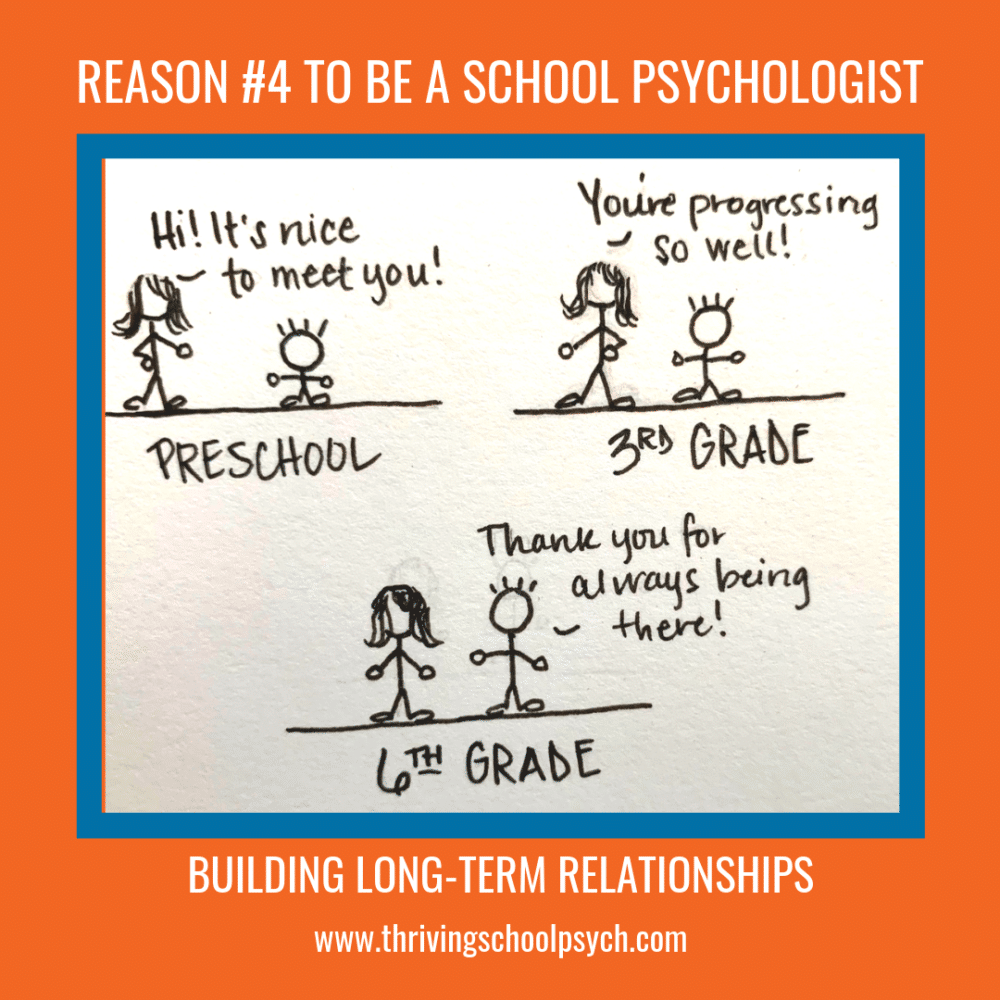
If you stay in a school or district long enough, you really get to know the students and their families. When you have a solid rapport with kids you’ve known for years, you can really make a difference. The research on resilience shows that to overcome aversive childhood experiences, students need at least one adult they can trust. You can be that adult in the school that they feel safe going to for support, and it’s a real honor.
A school psychologist in our community wrote about the long-term rewards of being a positive force in a student’s life. She wrote that she was stopped at a 5th grade graduation and a grandparent said, “See this lady? You may not remember her, but she’s had your back since preschool and has helped you through the tough times without you even knowing it. Thank you for always being there.”
Stories like these are a big part of why school psychologists do this job and what keeps you going, even through difficult periods. The seeds are planted every day for being a positive influence on students over time.
5) You Get to be a “Strength Amplifier.”
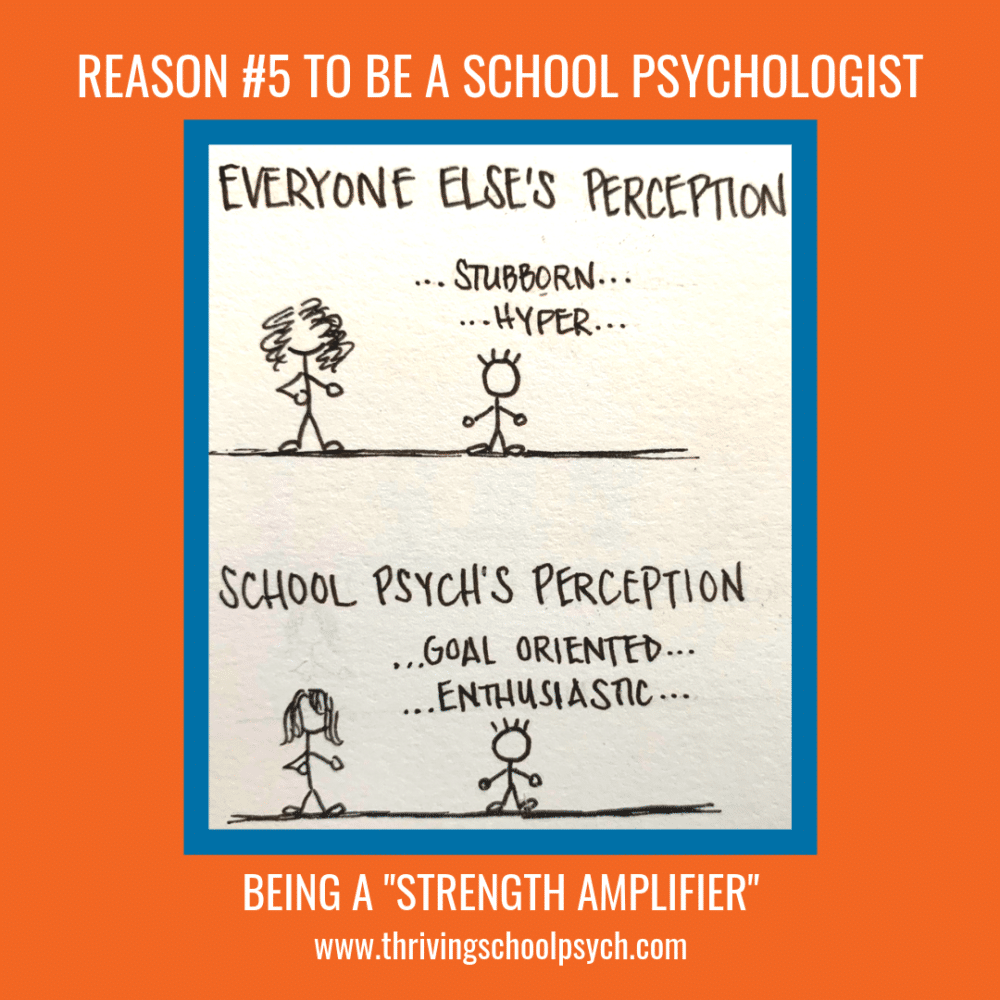
School psychologists are experts in the development of academic, social-emotional, and behavioral learning. You see the “long view” for students and when you assess a student, you can get a snapshot of their strengths and areas of need. This creates a valuable opportunity to offer students who aren’t feeling successful at school the chance to feel successful.
School psychologists spread knowledge and awareness about different abilities and differences in how kids learn, play, feel, and react to the world around them. Or, as one school psychologist put it, “The most rewarding part for me is when a student can tell me they better understand how their brain works.”
Even when it comes to students with significant disabilities, you get to be the one to really investigate and dive deep into understanding their needs so that you can uncover hidden strengths. As another school psychologist wrote about her favorite part of being a school psychologist: “I work with the moderate to severely handicapped, and turn over every stone when it comes to taking steps with the team to try to get each student to the next level of progress. It’s so challenging but the fight is worth it to see a child achieve something they couldn’t before.”
6) You Get to Empower Parents to Garner Needed Supports for a Student
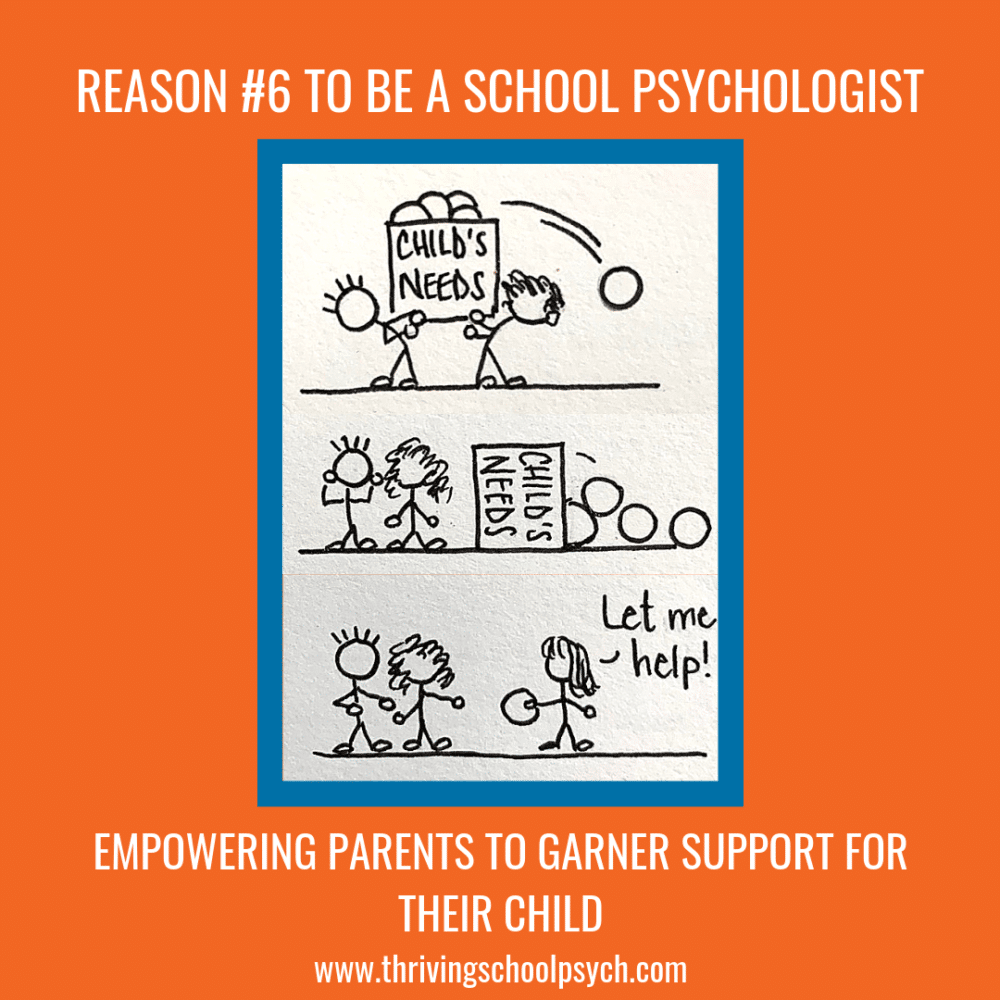
The needs of students can be complex. Parents can often feel overwhelmed and not fully equipped to understand how to get the best support for their child.
School psychologists can provide the “big picture” view of the supports available to students, ranging from in-class accommodations and school-wide supports to special education, individualized intensive interventions, and special alternative schools for students. Using this lens, you can partner with parents and be their guide through the process. When you partner with parents, you become part of creating a strong and collaborative school culture.
The reward of having a parent thank you for helping them navigate the complexities of how to address their child’s needs is so rewarding. As one school psychologist noted, her favorite part of being a school psychologist is getting support services done right. She writes, “I love seeing students and their families feel belonging at school, often for the first time EVER.” Indeed, with under-resourced schools, you can often be the one to pick up a dropped ball and help parents make it right by getting the necessary support for their child.
7) You Get to Collaborate with Teachers and Other Support Professionals on a Team
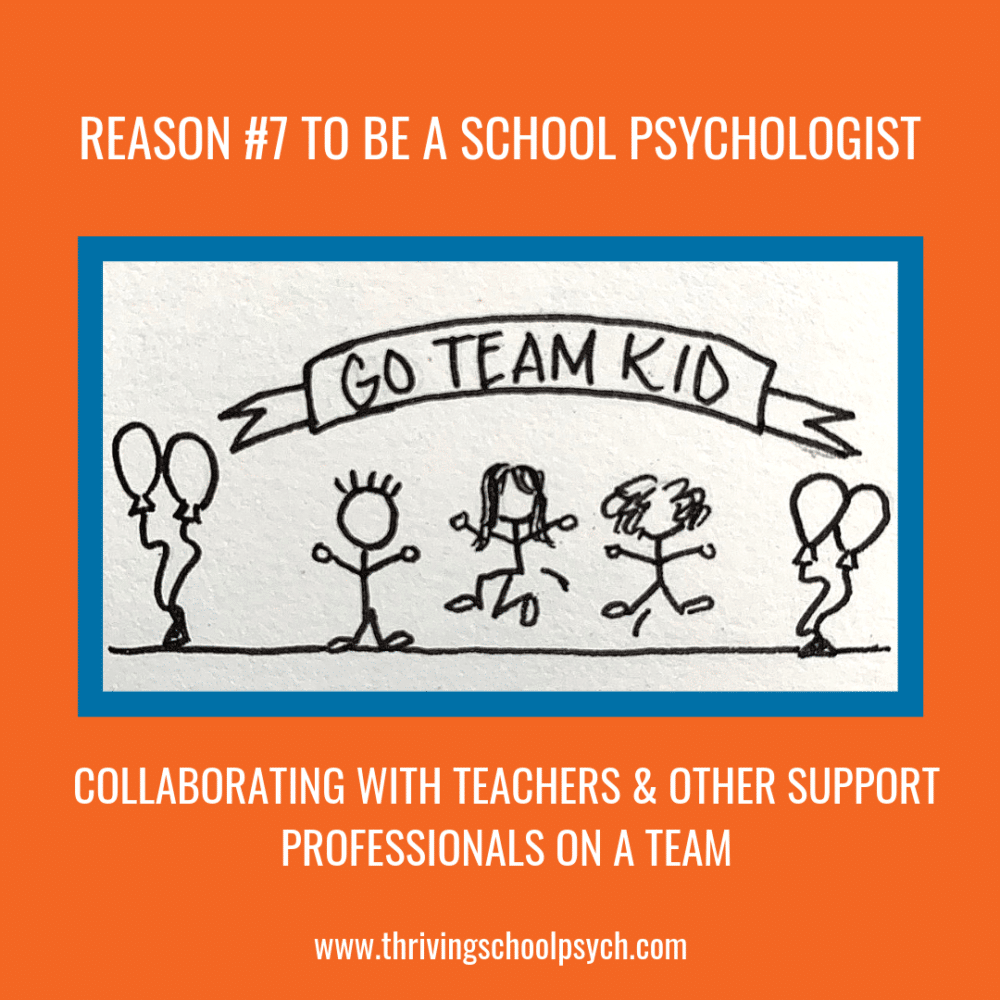
Teachers need support in making sure that they are serving their students in the best ways they can AND have the needed intervention strategies to reach and teach the diverse learning needs of their students. One of the perks of being a school psychologist is that you can connect with inspiring teachers doing amazing things for kids and learn from their awesome. You can also consult with teachers to provide much needed support for working with children who have complex needs.
As a school psychologist, you get to be in the classroom, observing teachers and student interactions, and serving as a thought partner with teachers. I learn so much from the teachers I observe in class and consult with about students I’m working with. Every interaction with a teacher is an opportunity for me to learn a new instructional or classroom management tool for my support toolbox.
There is also so much reward in knowing that when you consult with a teacher about a child with a learning, mental health, or behavioral need, you are not only supporting that teacher, but also being a catalyst for expanding her skill-set for supporting other children with similar needs.
8) You Get to be Constantly Learning New and Interesting Things
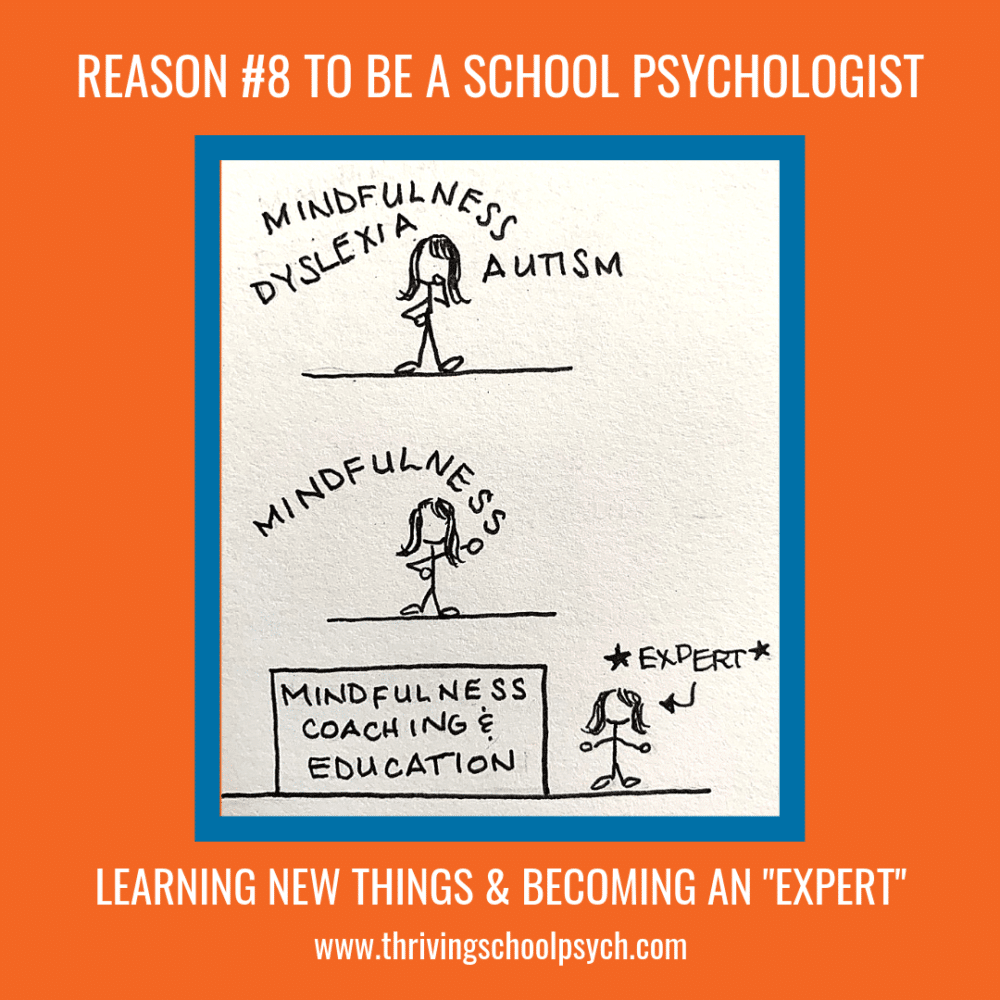
There is no shortage of on-the-job learning as a school psychologist! You are constantly getting to dive deeper into understanding neuroscience, principles of learning, behavioral management tools, strategies for enhancing social-emotional learning, and understanding how to support students with a wide range of disabilities.
I have joked before that every year of being a school psychologist is like a dog year of learning, and it’s really quite accurate! Every year I learn so much more, because every year there is new and exciting research about child development and learning.
You can also become a “mini-expert” in areas of interest and work with your schools on passion projects related to that interest. Want to support students with executive functioning difficulties? Have a passion for teaching students mindfulness? Want to work with students with dyslexia?
There are a number of ways you can go deeper into your area of interest: You can consult with teachers about the topic, provide individual or small-group counseling and coaching to boost students’ skills, host a parent education night, or even do a school-wide intervention where you build awareness and develop a positive culture of supporting critical skills you care about.
9) Job Security and Freedom to Relocate
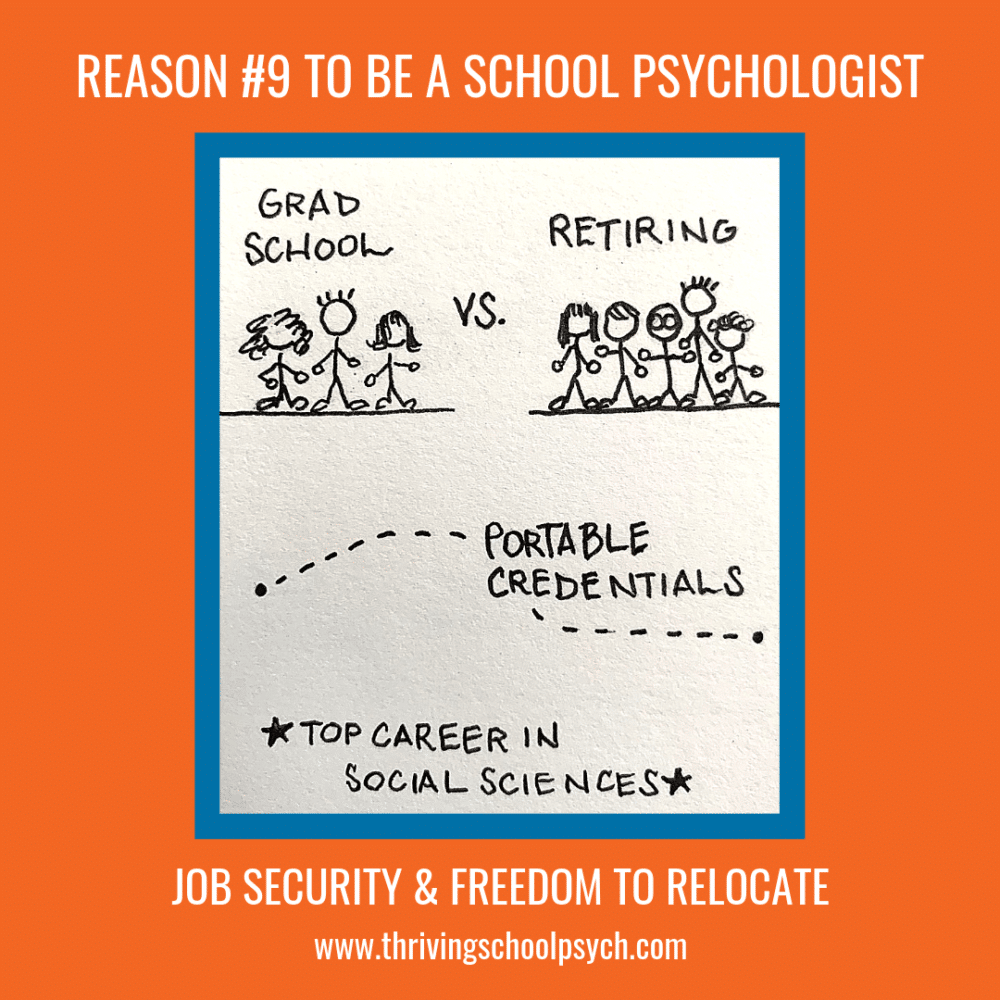
US News and World Report career guides consistently rank School Psychology as one of the top careers in the social sciences, year after year. One of the reasons cited in the 2019 report is the growth in the job market and availability of open positions. The number of school psychologist graduate students is not keeping pace with the number of folks retiring.
Oh, and if you’re a bilingual school psychologist, you’re practically a unicorn that any district would love to hire! With the increasing linguistic diversity of the student population, there is a real need for bilingual school psychologists.
In addition to open positions, another benefit of school psychologist credentials is that they are much more portable than an MFT or professional psychologist credential. Especially if you have your National Certification of School Psychology (NCSP) credential, you won’t be looking at redoing coursework and supervised hours if you have to move states. Many graduate school programs are NCSP-approved, and even if they’re not, you can still get your NCSP credential if you move states and need to do so.
10) You Get to Be an Advocate for Kids
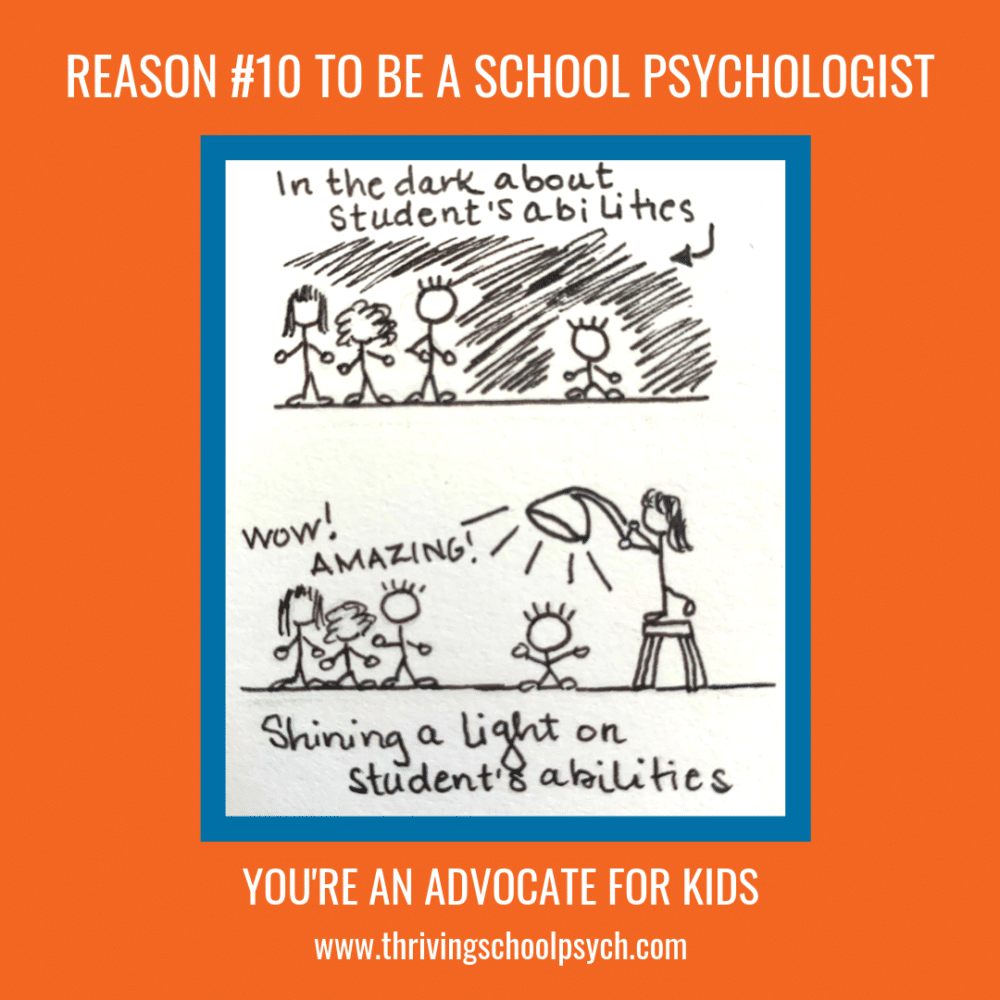
When I polled school psychologists about the top reason that they love their job, a theme that emerged over and over was being able to speak up for kids who are unable or afraid to advocate for themselves. Being a true advocate for kiddos is a huge source of fuel for school psychologists.
As one school psych put it, her favorite part of the job is “Being an advocate for the underdog, sometimes being the only one in your student’s corner, going against the grain and dropping knowledge so that we change how we interact and view a student.”
YESSSSS!! I totally agree. I love being a catalyst for shifting adults’ perspectives to see a student in a new, positive, and hopeful light.
Similarly, there is a ton of room for advocacy in the special education system. Being experts in the inter-working between school systems and support services, we can make a real difference in students’ learning trajectories. We can connect students to the just-right level of support, whether that support is in the general education classroom or in the special education system.
When allocation of support services is done right, students and families feel a sense of belonging at school. There is nothing more rewarding than seeing students flourish when we successfully partner with parents, teachers, and support staff to rally needed supports around students.
Bonus Reason!
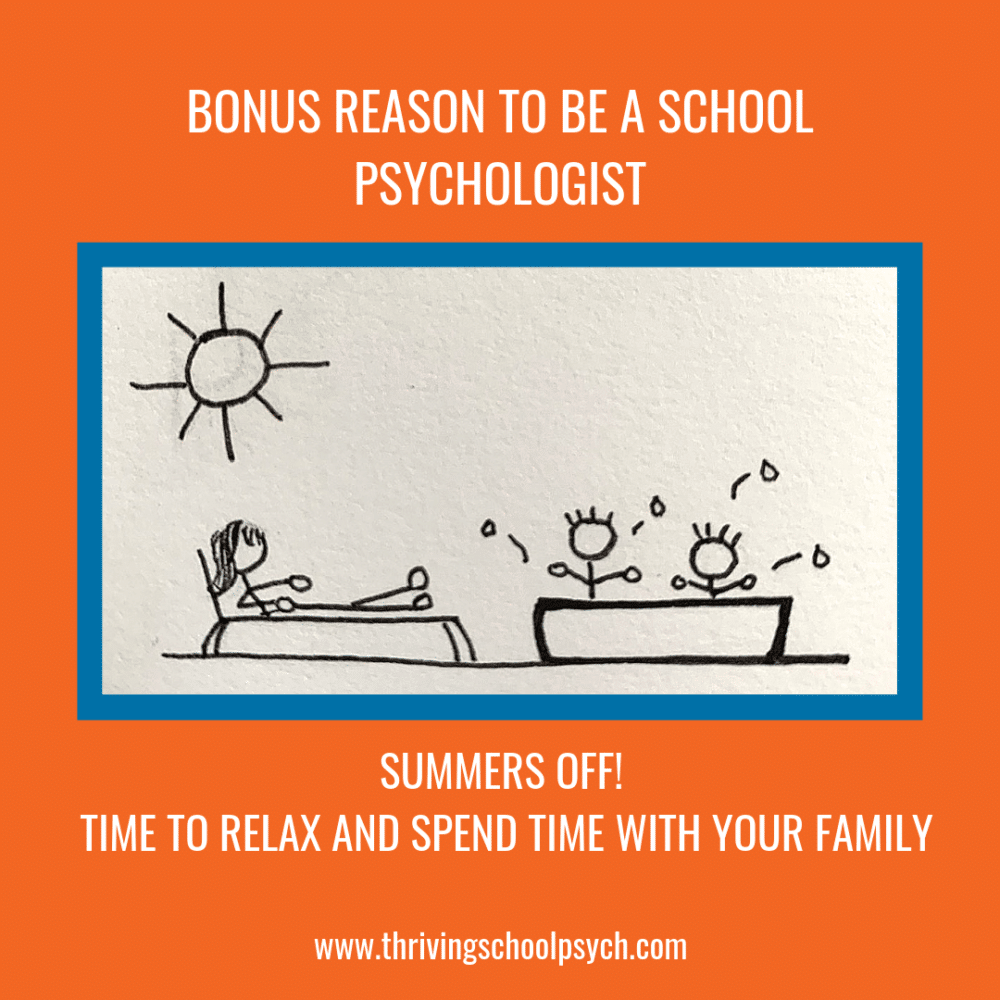
And if that weren’t enough…you also get summers and school vacation time off! This is a huge bonus reason, especially if you have a family of your own or plan to have a family. School psychology is a really family-friendly career, because you are basically on the same schedule as your kids.
Want to Display Your Love of School Psychology?
Oh yeah…got PSYCHED….the Top 10 Reasons to Be a School Psychologist poster is now available! Go on, treat yo’ self or a favorite school psych BFF to some office decor that reminds you of our career’s special blend of awesome-sauce every day!
Click here to order the poster!
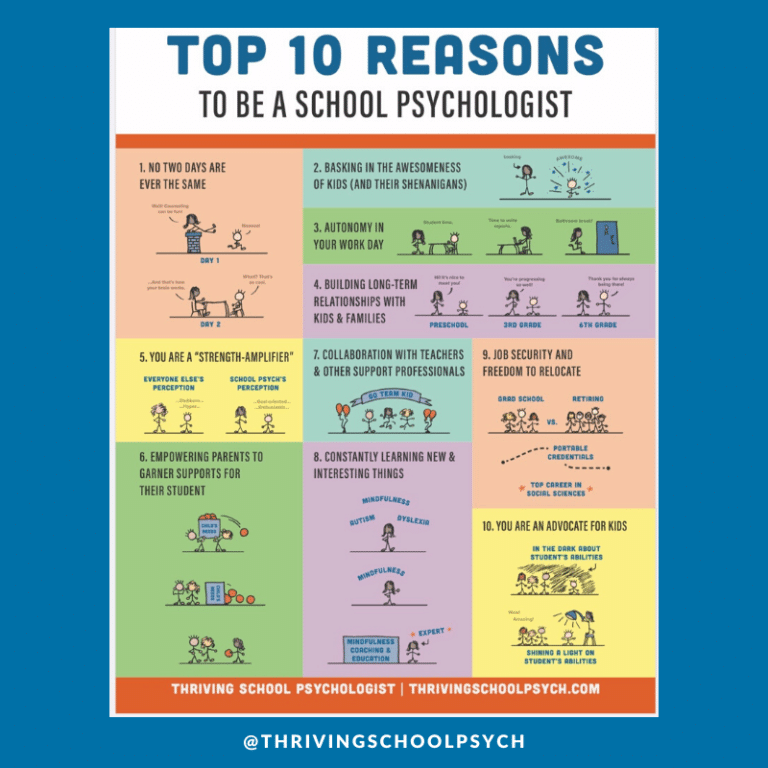
Do You Want to Learn More About Reasons Why School Psychology is an Amazing Career?
I give you full permission to follow me all over the Internet!
And I’d love to hear from you practicing school psychologists out there–what is you top reason you love being a school psychologist?
Website: www.thrivingschoolpsych.com
Shop (Get the 10 Reasons to be a School Psychologist Poster today!): www.thrivingschoolpsych.com/shop
Facebook (for school psychologist resources and school psych humor): @thrivingschoolpsych
Facebook (for school psychologist resources + mental health advocacy): @thrivingstudents
Instagram (for school psychologist resources + mental health advocacy) @thrivingschoolpsych
LinkedIn (for school psychologists, district leaders, and mental health advocates): https://www.linkedin.com/in/drrebeccabranstetter/
Dr. Rebecca Branstetter is a school psychologist, speaker, and author on a mission to help public school psychologists manage their stress, improve their efficacy and enjoyment in their work, and prevent getting burned out so they can focus on what they love to do—being champions for helping children be the best they can be in school and in life and supporting educators and families.
